- Home
- Elizabeth Gaskell
The Poor Clare Page 2
The Poor Clare Read online
Page 2
I have said that she had not heard from Mary for some time. In her last letter, she had told of travelling about with her mistress, who was the English wife of some great foreign officer, and had spoken of her chances of making a good marriage, without naming the gentleman’s name, keeping it rather back as a pleasant surprise to her mother; his station and fortune being, as I had afterwards reason to know, far superior to anything she had a right to expect. Then came a long silence; and Madam was dead, and the Squire was dead; and Bridget’s heart was gnawed by anxiety, and she knew not whom to ask for news of her child. She could not write, and the Squire had managed her communication with her daughter. She walked off to Hurst; and got a good priest there—one whom she had known at Antwerp—to write for her. But no answer came. It was like crying into the awful stillness of night.
One day, Bridget was missed by those neighbours who had been accustomed to mark her goings-out and comings-in. She had never been sociable with any of them; but the sight of her had become a part of their daily lives, and slow wonder arose in their minds, as morning after morning came, and her house-door remained closed, her window dead from any glitter, or light of fire within. At length some one tried the door; it was locked. Two or three laid their heads together, before daring to look in through the blank unshuttered window. But, at last, they summoned up courage; and then saw that Bridget’s absence from their little world was not the result of accident or death, but of premeditation. Such small articles of furniture as could be secured from the effects of time and damp by being packed up, were stowed away in boxes. The picture of the Madonna was taken down, and gone. In a word, Bridget had stolen away from her home, and left no trace whither she was departed. I knew afterwards, that she and her little dog had wandered off on the long search for her lost daughter. She was too illiterate to have faith in letters, even had she had the means of writing and sending many. But she had faith in her own strong love, and believed that her passionate instinct would guide her to her child. Besides, foreign travel was no new thing to her, and she could speak enough of French to explain the object of her journey, and had, moreover, the advantage of being, from her faith, a welcome object of charitable hospitality at many a distant convent. But the country people round Starkey Manor-house knew nothing of all this. They wondered what had become of her, in a torpid, lazy fashion, and then left off thinking of her altogether. Several years passed. Both Manor-house and cottage were deserted. The young Squire lived far away under the direction of his guardians. There were inroads of wool and corn into the sitting-rooms of the Hall; and there was some low talk, from time to time, among the hinds and country people whether it would not be as well to break into old Bridget’s cottage, and save such of her goods as were left from the moth and rust which must be making sad havoc. But this idea was always quenched by the recollection of her strong character and passionate anger; and tales of her masterful spirit, and vehement force of will, were whispered about, till the very thought of offending her, by touching any article of hers, became invested with a kind of horror: it was believed that, dead or alive, she would not fail to avenge it.
Suddenly she came home; with as little noise or note of preparation as she had departed. One day some one noticed a thin, blue curl of smoke ascending from her chimney. Her door stood open to the noonday sun; and, ere many hours had elapsed, some one had seen an old travel-and-sorrow-stained woman dipping her pitcher in the well; and said, that the dark, solemn eyes that looked up at him were more like Bridget Fitzgerald’s than any one else’s in this world; and yet, if it were she, she looked as if she had been scorched in the flames of hell, so brown, and scared, and fierce a creature did she seem. By-and-by many saw her; and those who met her eye once cared not to be caught looking at her again. She had got into the habit of perpetually talking to herself; nay, more, answering herself, and varying her tones according to the side she took at the moment. It was no wonder that those who dared to listen outside her door at night believed that she held converse with some spirit; in short, she was unconsciously earning for herself the dreadful reputation of a witch.
Her little dog, which had wandered half over the Continent with her, was her only companion; a dumb remembrancer of happier days. Once he was ill; and she carried him more than three miles, to ask about his management from one who had been groom to the last Squire, and had then been noted for his skill in all diseases of animals. Whatever this man did, the dog recovered; and they who heard her thanks, intermingled with blessings (that were rather promises of good fortune than prayers), looked grave at his good luck when, next year, his ewes twinned, and his meadow-grass was heavy and thick.
Now it so happened that, about the year seventeen hundred and eleven, one of the guardians of the young Squire, a certain Sir Philip Tempest, bethought him of the good shooting there must be on his ward’s property; and in consequence he brought down four or five gentlemen, of his friends, to stay for a week or two at the Hall. From all accounts, they roystered and spent pretty freely. I never heard any of their names but one, and that was Squire Gisborne’s. He was hardly a middle-aged man then; he had been much abroad, and there, I believe, he had known Sir Philip Tempest, and done him some service. He was a daring and dissolute fellow in those days: careless and fearless, and one who would rather be in a quarrel than out of it. He had his fits of ill-temper besides, when he would spare neither man nor beast. Otherwise, those who knew him well, used to say he had a good heart, when he was neither drunk, nor angry, nor in any way vexed. He had altered much when I came to know him.
One day, the gentlemen had all been out shooting, and with but little success, I believe; anyhow, Mr. Gisborne had none, and was in a black humour accordingly. He was coming home, having his gun loaded, sportsman-like, when little Mignon crossed his path, just as he turned out of the wood by Bridget’s cottage. Partly for wantonness, partly to vent his spleen upon some living creature. Mr. Gisborne took his gun, and fired—he had better have never fired gun again, than aimed that unlucky shot, he hit Mignon, and at the creature’s sudden cry, Bridget came out, and saw at a glance what had been done. She took Mignon up in her arms, and looked hard at the wound; the poor dog looked at her with his glazing eyes, and tried to wag his tail and lick her hand, all covered with blood. Mr. Gisborne spoke in a kind of sullen penitence:
“You should have kept the dog out of my way—a little poaching varmint.”
At this very moment, Mignon stretched out his legs, and stiffened in her arms—her lost Mary’s dog, who had wandered and sorrowed with her for years. She walked right into Mr. Gisborne’s path, and fixed his unwilling, sullen look, with her dark and terrible eye.
“Those never throve that did me harm,” said she. “I’m alone in the world, and helpless; the more do the saints in heaven hear my prayers. Hear me, ye blessed ones! hear me while I ask for sorrow on this bad, cruel man. He has killed the only creature that loved me—the dumb beast that I loved. Bring down heavy sorrow on his head for it, O ye saints! He thought that I was helpless, because he saw me lonely and poor; but are not the armies of heaven for the like of me?”
“Come, come,” said he, half remorseful, but not one whit afraid. “Here’s a crown to buy thee another dog. Take it, and leave off cursing! I care none for thy threats.”
“Don’t you?” said she, coming a step closer, and changing her imprecatory cry for a whisper which made the gamekeeper’s lad, following Mr. Gisborne, creep all over. “You shall live to see the creature you love best, and who alone loves you—ay, a human creature, but as innocent and fond as my poor, dead darling—you shall see this creature, for whom death would be too happy, become a terror and a loathing to all, for this blood’s sake. Hear me, O holy saints, who never fail them that have no other help!”
She threw up her right hand, filled with poor Mignon’s life-drops; they spurted, one or two of them, on his shooting-dress,—an ominous sight to the follower. But the master only laughed a little, forced, scornful laugh, and went on to the Hall
. Before he got there, however, he took out a gold piece, and bade the boy carry it to the old woman on his return to the village. The lad was “afeared,” as he told me in after years; he came to the cottage, and hovered about, not daring to enter. He peeped through the window at last; and by the flickering wood-flame, he saw Bridget kneeling before the picture of Our Lady of the Holy Heart, with dead Mignon lying between her and the Madonna. She was praying wildly, as her outstretched arms betokened. The lad shrunk away in redoubled terror; and contented himself with slipping the gold piece under the ill-fitting door. The next day it was thrown out upon the midden; and there it lay, no one daring to touch it.
Meanwhile Mr. Gisborne, half curious, half uneasy, thought to lessen his uncomfortable feelings by asking Sir Philip who Bridget was? He could only describe her—he did not know her name. Sir Philip was equally at a loss. But an old servant of the Starkeys, who had resumed his livery at the Hall on this occasion—a scoundrel whom Bridget had saved from dismissal more than once during her palmy days—said:—
“It will be the old witch, that his worship means. She needs a ducking, if ever a woman did, does that Bridget Fitzgerald.”
“Fitzgerald!” said both the gentlemen at once. But Sir Philip was the first to continue:—
“I must have no talk of ducking her, Dickon. Why, she must be the very woman poor Starkey bade me have a care of; but when I came here last she was gone, no one knew where. I’ll go and see her to-morrow. But mind you, sirrah, if any harm comes to her, or any more talk of her being a witch—I’ve a pack of hounds at home, who can follow the scent of a lying knave as well as ever they followed a dog-fox; so take care how you talk about ducking a faithful old servant of your dead master’s.”
“Had she ever a daughter?” asked Mr. Gisborne, after a while.
“I don’t know—yes! I’ve a notion she had; a kind of waiting woman to Madam Starkey.”
“Please your worship,” said humbled Dickon, “Mistress Bridget had a daughter—one Mistress Mary—who went abroad, and has never been heard on since; and folk do say that has crazed her mother.”
Mr. Gisborne shaded his eyes with his hand.
“I could wish she had not cursed me,” he muttered. “She may have power—no one else could.” After a while, he said aloud, no one understanding rightly what he meant, “Tush! it is impossible!”—and called for claret; and he and the other gentlemen set-to to a drinking-bout.
CHAPTER II
I now come to the time in which I myself was mixed up with the people that I have been writing about. And to make you understand how I became connected with them, I must give you some little account of myself. My father was the younger son of a Devonshire gentleman of moderate property; my eldest uncle succeeded to the estate of his forefathers, my second became an eminent attorney in London, and my father took orders. Like most poor clergymen, he had a large family; and I have no doubt was glad enough when my London uncle, who was a bachelor, offered to take charge of me, and bring me up to be his successor in business.
In this way I came to live in London, in my uncle’s house, not far from Gray’s Inn, and to be treated and esteemed as his son, and to labour with him in his office. I was very fond of the old gentleman. He was the confidential agent of many country squires, and had attained to his present position as much by knowledge of human nature as by knowledge of law; though he was learned enough in the latter. He used to say his business was law, his pleasure heraldry. From his intimate acquaintance with family history, and all the tragic courses of life therein involved, to hear him talk, at leisure times, about any coat of arms that came across his path was as good as a play or a romance. Many cases of disputed property, dependent on a love of genealogy, were brought to him, as to a great authority on such points. If the lawyer who came to consult him was young, he would take no fee, only give him a long lecture on the importance of attending to heraldry; if the lawyer was of mature age and good standing, he would mulct him pretty well, and abuse him to me afterwards as negligent of one great branch of the profession. His house was in a stately new street called Ormond Street, and in it he had a handsome library; but all the books treated of things that were past; none of them planned or looked forward into the future. I worked away—partly for the sake of my family at home, partly because my uncle had really taught me to enjoy the kind of practice in which he himself took such delight. I suspect I worked too hard; at any rate, in seventeen hundred and eighteen I was far from well, and my good uncle was disturbed by my ill looks.
One day, he rang the bell twice into the clerk’s room at the dingy office in Gray’s Inn Lane. It was the summons for me, and I went into his private room just as a gentleman—whom I knew well enough by sight as an Irish lawyer of more reputation than he deserved—was leaving.
My uncle was slowly rubbing his hands together and considering. I was there two or three minutes before he spoke. Then he told me that I must pack up my portmanteau that very afternoon, and start that night by post-horse for West Chester. I should get there, if all went well, at the end of five days’ time, and must then wait for a packet to cross over to Dublin; from thence I must proceed to a certain town named Kildoon, and in that neighbourhood I was to remain, making certain inquiries as to the existence of any descendants of the younger branch of a family to whom some valuable estates had descended in the female line. The Irish lawyer whom I had seen was weary of the case, and would willingly have given up the property, without further ado, to a man who appeared to claim them; but on laying his tables and trees before my uncle, the latter had foreseen so many possible prior claimants, that the lawyer had begged him to undertake the management of the whole business. In his youth, my uncle would have liked nothing better than going over to Ireland himself, and ferreting out every scrap of paper or parchment, and every word of tradition respecting the family. As it was, old and gouty, he deputed me.
Accordingly, I went to Kildoon. I suspect I had something of my uncle’s delight in following up a genealogical scent, for I very soon found out, when on the spot, that Mr. Rooney, the Irish lawyer, would have got both himself and the first claimant into a terrible scrape, if he had pronounced his opinion that the estates ought to be given up to him. There were three poor Irish fellows, each nearer of kin to the last possessor; but, a generation before, there was a still nearer relation, who had never been accounted for, nor his existence ever discovered by the lawyers, I venture to think, till I routed him out from the memory of some of the old dependants of the family. What had become of him? I travelled backwards and forwards; I crossed over to France, and came back again with a slight clue, which ended in my discovering that, wild and dissipated himself, he had left one child, a son, of yet worse character than his father; that this same Hugh Fitzgerald had married a very beautiful serving-woman of the Byrnes—a person below him in hereditary rank, but above him in character; that he had died soon after his marriage, leaving one child, whether a boy or a girl I could not learn, and that the mother had returned to live in the family of the Byrnes. Now, the chief of this latter family was serving in the Duke of Berwick’s regiment, and it was long before I could hear from him; it was more than a year before I got a short, haughty letter—I fancy he had a soldier’s contempt for a civilian, an Irishman’s hatred for an Englishman, an exiled Jacobite’s jealousy of one who prospered and lived tranquilly under the government he looked upon as an usurpation. “Bridget Fitzgerald,” he said, “had been faithful to the fortunes of his sister—had followed her abroad, and to England when Mrs. Starkey had thought fit to return. Both his sister and her husband were dead, he knew nothing of Bridget Fitzgerald at the present time: probably Sir Philip Tempest, his nephew’s guardian, might be able to give me some information.” I have not given the little contemptuous terms; the way in which faithful service was meant to imply more than it said—all that has nothing to do with my story. Sir Philip, when applied to, told me that he paid an annuity regularly to an old woman named Fitzgerald, living at Coldholm
e (the village near Starkey Manor-house). Whether she had any descendants he could not say.
One bleak March evening, I came in sight of the places described at the beginning of my story. I could hardly understand the rude dialect in which the direction to old Bridget’s house was given.
“Yo’ see yon furleets,” all run together, gave me no idea that I was to guide myself by the distant lights that shone in the windows of the Hall, occupied for the time by a farmer who held the post of steward, while the Squire, now four or five and twenty, was making the grand tour. However, at last, I reached Bridget’s cottage—a low, moss-grown place; the palings that had once surrounded it were broken and gone; and the underwood of the forest came up to the walls, and must have darkened the windows. It was about seven o’clock—not late to my London notions—but, after knocking for some time at the door and receiving no reply, I was driven to conjecture that the occupant of the house was gone to bed. So I betook myself to the nearest church I had seen, three miles back on the road I had come, sure that close to that I should find an inn of some kind; and early the next morning I set off back to Coldholme, by a field-path which my host assured me I should find a shorter cut than the road I had taken the night before. It was a cold, sharp morning; my feet left prints in the sprinkling of hoar-frost that covered the ground; nevertheless, I saw an old woman, whom I instinctively suspected to be the object of my search, in a sheltered covert on one side of my path. I lingered and watched her. She must have been considerably above the middle size in her prime, for when she raised herself from the stooping position in which I first saw her, there was something fine and commanding in the erectness of her figure. She drooped again in a minute or two, and seemed looking for something on the ground, as, with bent head, she turned off from the spot where I gazed upon her, and was lost to my sight. I fancy I missed my way, and made a round in spite of the landlord’s directions; for by the time I had reached Bridget’s cottage she was there, with no semblance of hurried walk or discomposure of any kind. The door was slightly ajar. I knocked, and the majestic figure stood before me, silently awaiting the explanation of my errand. Her teeth were all gone, so the nose and chin were brought near together; the gray eyebrows were straight, and almost hung over her deep, cavernous eyes, and the thick white hair lay in silvery masses over the low, wide, wrinkled forehead. For a moment, I stood uncertain how to shape my answer to the solemn questioning of her silence.

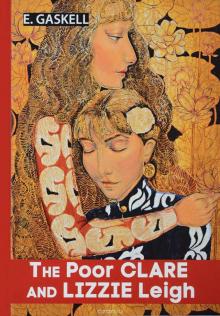 Lizzie Leigh
Lizzie Leigh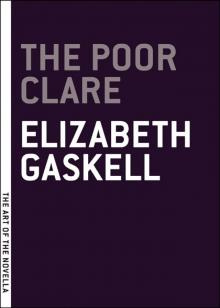 The Poor Clare
The Poor Clare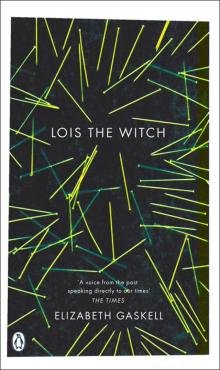 Lois the Witch
Lois the Witch North and South
North and South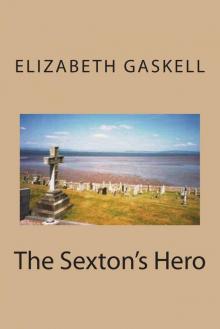 Sexton's Hero
Sexton's Hero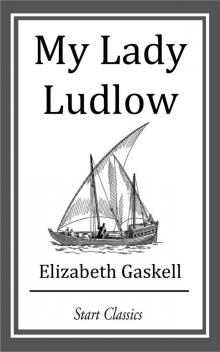 My Lady Ludlow
My Lady Ludlow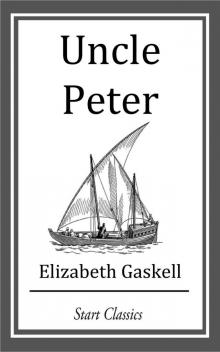 Uncle Peter
Uncle Peter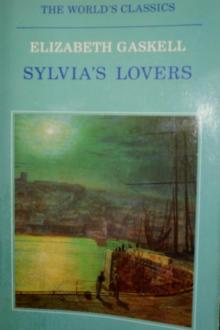 Sylvia's Lovers Elizabeth Cleghorn Gaskell
Sylvia's Lovers Elizabeth Cleghorn Gaskell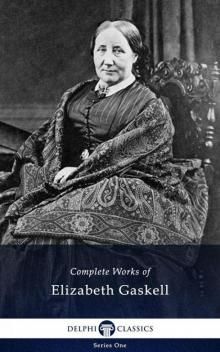 Delphi Complete Works of Elizabeth Gaskell
Delphi Complete Works of Elizabeth Gaskell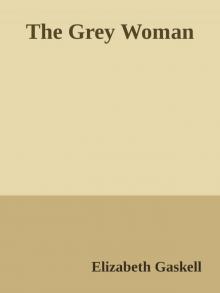 The Grey Woman
The Grey Woman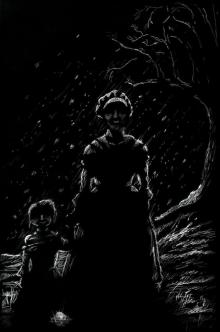 The Old Nurse's Story and Other Tales
The Old Nurse's Story and Other Tales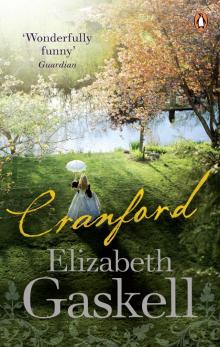 Cranford
Cranford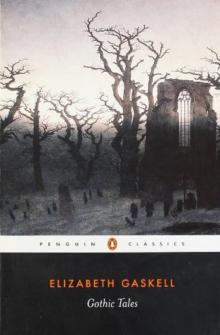 Gothic Tales
Gothic Tales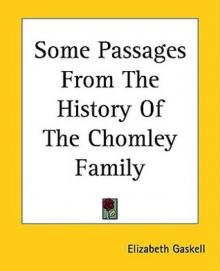 Some Passages From the History of the Chomley Family
Some Passages From the History of the Chomley Family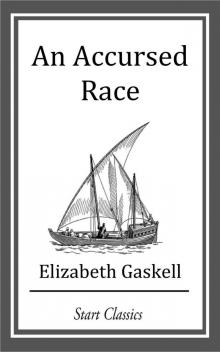 An Accursed Race
An Accursed Race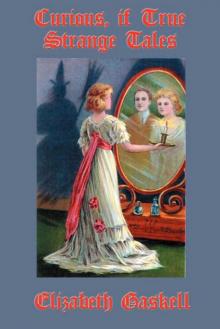 Curious, if True: Strange Tales Elizabeth Cleghorn Gaskell
Curious, if True: Strange Tales Elizabeth Cleghorn Gaskell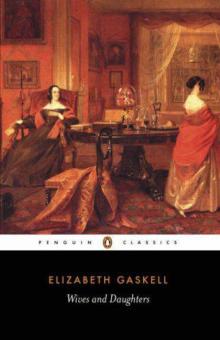 Wives and Daughters
Wives and Daughters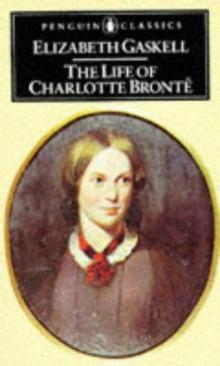 The life of Charlotte Brontë
The life of Charlotte Brontë